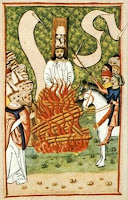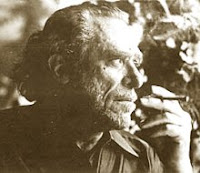 |
| Is this really John Doe? |
Imagine your name is actually John Doe. There goes any hope for individuality. But if John Doe answers that he is John Doe, what if one day he decides to legally change his name to Jack Smith? Would he be a completely different person simply because he switched names?
Names feel comforting, and they do give us a sense of continuous identity. People call us by our names, and we tend to refer to ourselves in the same manner. Sometimes nicknames are prompted but they are only a slight addition to the repertoire of names. We cling to our names because they give us stability and even John Doe will get a sense of comfort and will attach a certain relevance and gravitas to his name.
But the other problem is that names are given, not chosen or selected. We are born into a certain family whose surname we will carry down the line and our parents choose a given name for us. By the time we are old enough to think and decide for ourselves, this name has been ingrained deeply within our consciousness so that we take it for granted; we consider it one with the personal identity we have developed over the years.
So who are we then? Some will say that the essence of the person is their personal soul. Often this essence will have the same name as the name-bearer. It is that which is immortal and will continue in the next life. It is that which will appear after John Doe has traveled on and left the plane of this existence and when he is called upon to reveal himself on the Ouija board. However, what a soul is and how it is manifested is too difficult and complex a question to address here and certainly deserves its own post.
Others define themselves by what they do for a living. It is interesting that we ask what people do for a living, yet when they answer they respond what they are, for example, a doctor, a teacher or a writer. Jobs often mark and shape our personality since most of us spend the majority of our lifetime working in a specific field. This steady exposure obviously must have an effect on our personality.
In fact, there are certain characteristics, sometimes stereotypes that are associated with a given profession. A teacher might correct your grammatical errors even during her off hours, while a psychologist will analyze his friends and family members on the weekends. When we think of politicians, we think of misinformation and manipulation and do not expect them to keep their word or promises even in their private lives.
Related to jobs are also income and social status. In a culture of prosperity, money has a tremendous effect on personality and self-esteem. It builds upon the Puritan spirit which (erroneously) equates wealth in the material world with being favored or even chosen by the divine. So not only are people divided economically and socially into haves and have-nots, they come to see and define themselves accordingly. You are what you have; your possessions come to define who you are.
Yet even if you add up all the different aspects and all the social roles, such as father, son, brother, job, we are still far away from defining who the person really is. We get only close approximations.
The problem is a lack of consistency. Even though people are generally predictable, there is always the occasional curve-ball to throw us off. A responsible person may get caught doing irresponsible acts. A shy person might suddenly throw all caution in the air and surprise us with shocking naughtiness.
One and the same person will also undergo changes, either minor through mood or major because of life experiences or even in some cases diseases. People might undergo transformation in a spiritual manner and find or lose God in the process. These fluctuations influence also the way a person is, their core being, the continuous fluid interaction between nature and nurture, where certain genes are primed while others are neglected.
Moreover, there are the issues of culture, religion, upbringing and nationality. To a large extent, we do not have much of a say in these matters for various years. Some people, however, manage to see beyond most of the limitations that these factors may impose on the individual. Yet it is like our childhood, very formative of and highly influential on the later self that we come to adopt over the years.
People are changing all the time. As we are growing up, we often grow into another person. There are many facets to each being. Those who accept and understand life as a continuous process will find it easier to adapt to the ebb and flows of their own being. But those who seek or try to hold onto the phantom of unity will often feel pressure and stress because life and existence are like birds; they are averse to being caught and locked up in a cage, no matter how beautiful or well-constructed the cage may be.





